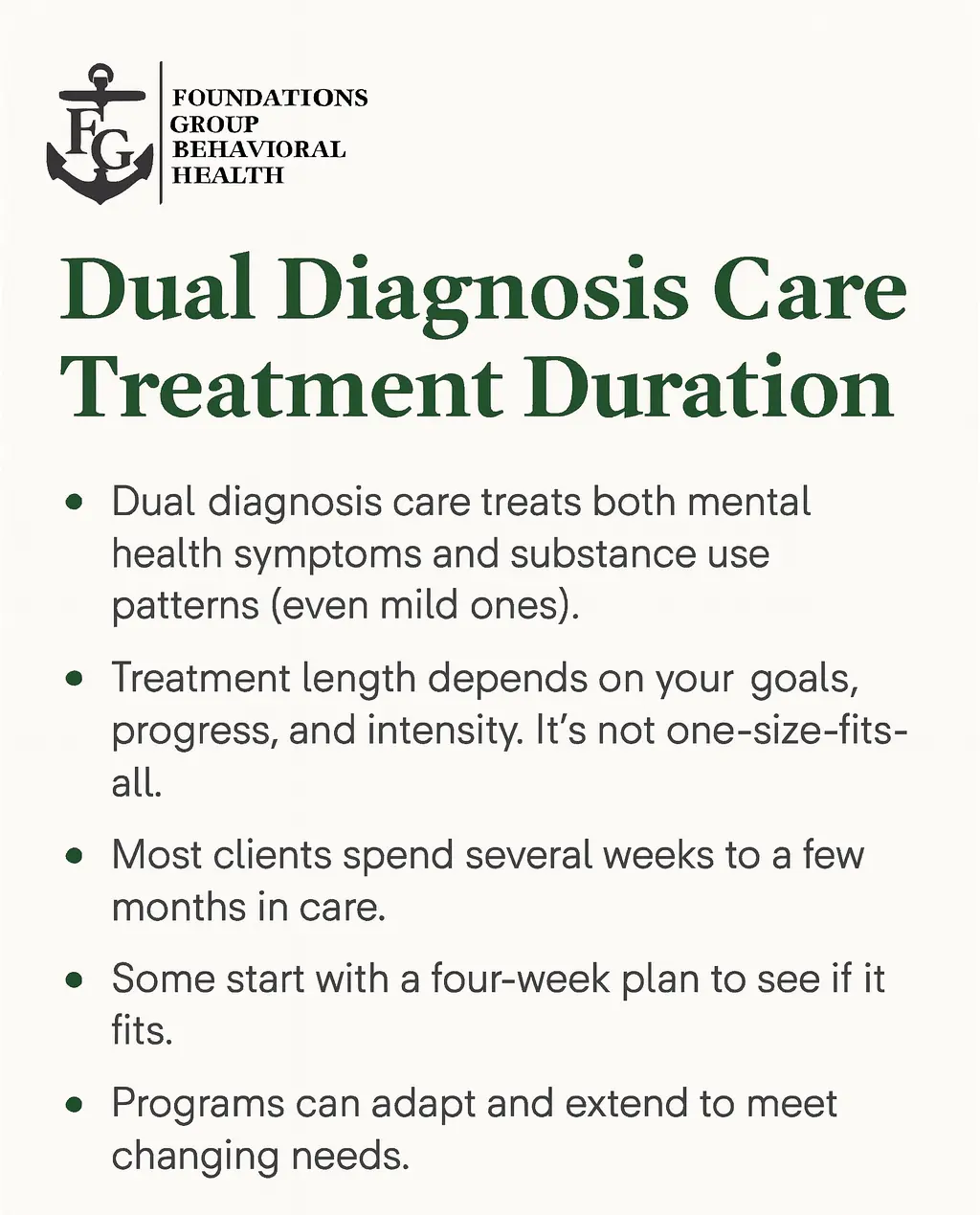You’re not in crisis. But something feels off.
Maybe the late-night glass of wine is becoming a pattern you’re not proud of. Maybe your moods shift more than they used to. Or maybe you’re just tired—mentally, emotionally—and wondering if things could feel lighter.
If you’re exploring what it means to live more intentionally—less reactive, more clearheaded—dual diagnosis treatment may be worth considering. It’s not just for people in crisis. It’s for anyone noticing patterns they no longer want to ignore.
At Foundations Group Behavioral Health in Cape Cod, MA, dual diagnosis care helps people understand the link between mental health and substance use—without assuming worst-case scenarios. And one of the most common questions we hear is:
“How long would I need to be in treatment?”
This guide answers that—gently, clearly, and from the perspective of a clinician who believes in curiosity, not labels.
What Is Dual Diagnosis Treatment—And Who’s It For?
Dual diagnosis treatment is designed for people experiencing both mental health symptoms and some form of substance use—whether that’s daily drinking, occasional cannabis, or a cycle of using to cope with stress or sleep.
But let’s be clear: you don’t have to identify as an “addict” to benefit. In fact, many people in dual diagnosis care are functioning just fine on the outside—showing up at work, taking care of others, and holding it all together. On the inside, though, they’re starting to feel tired. Frayed. Disconnected.
That’s where this kind of treatment becomes valuable.
Because it doesn’t just focus on removing a behavior—it explores the why underneath it. Why am I anxious at night? Why do I feel flat even when nothing’s “wrong”? Why do I drink when I’m lonely, even though I said I wouldn’t?
If these are the questions circling in your mind, dual diagnosis treatment might be the answer you didn’t know existed.
Is There a Standard Duration for Dual Diagnosis Treatment?
Not exactly—and that’s a good thing.
Dual diagnosis care isn’t a cookie-cutter process. Unlike a fixed 28-day rehab stay, it’s often delivered in outpatient settings where flexibility is part of the design. Your treatment might last six weeks—or six months. It depends on:
- What you’re coming in with (emotional overwhelm, substance patterns, trauma)
- What level of support you need (group therapy, individual care, medication)
- How fast (or slow) you want to move
Some clients make significant progress in eight weeks of twice-a-week sessions. Others appreciate the steadiness of a 12-week program followed by step-down support. At Foundations Group Behavioral Health in Falmouth, MA, we help you create a pace that feels sustainable—not stressful.
What Are the Different Program Types—and How Do They Affect Time Commitment?
Your treatment journey might begin in one of several formats. Here’s how each influences the timeline:
1. Intensive Outpatient Program (IOP)
This typically involves 3–4 days per week of structured group and individual therapy. Many people stay in IOP for 6–12 weeks, depending on their goals and stability. IOP is ideal if you’re looking for deeper support while still living at home.
2. Partial Hospitalization Program (PHP)
PHP offers a more immersive experience—usually 5 days a week, often for 3–4 weeks. It’s helpful for people dealing with high anxiety, mood swings, or who need more day-time structure without inpatient care.
3. Outpatient Therapy or Step-Down Care
This can be once or twice a week and may last for several months or longer. Some clients transition to this after completing IOP. Others start here when they’re not ready for group settings but want to begin exploring change.
In Barnstable County, MA, we see a wide range of timelines. Some clients find their rhythm quickly. Others stay connected to care over time, using therapy as a kind of emotional maintenance.
Does Starting with a Short Commitment Still Help?
Absolutely.
There’s value in starting small. Think of it as giving yourself a “window” to be supported and seen—without pressure to figure it all out.
Many of our clients begin with a 4-week plan. During that time, they get to know their therapist, explore how their moods and behaviors connect, and try out group settings. By the end of the first month, they usually know whether they want to continue, shift directions, or pause.
One client put it this way:
“I didn’t sign up thinking I was broken. I signed up because I was curious about what life could feel like with less noise. Four weeks in, I could already tell—I felt more like myself again.”
What Signs Show That Treatment Is Working?
Treatment isn’t always linear—but progress leaves clues. You might notice:
- You’re less reactive in situations that used to throw you off
- You’re sleeping better or feeling more emotionally steady
- You start questioning old habits instead of following them automatically
- You feel more hopeful—even on hard days
Some people don’t notice change right away. That’s okay too. Emotional growth can be quiet, like the way spring comes to Cape Cod—first the air changes, then the buds appear.
Can Treatment Be Extended If I Need More Time?
Yes—and many people do.
You’re not locked into a set contract. In fact, the most successful treatment often adapts as you grow. That might look like:
- Adding individual sessions as things come up
- Extending IOP from 8 to 12 weeks
- Shifting into a step-down outpatient track after group care ends
At Foundations Group Behavioral Health, our clinicians work with you—not above you—to adjust timelines and care plans as your needs shift. This is your process. We’re just here to help you navigate it.
Is There a “Right” Time to End Treatment?
Not really. But there are meaningful signals that you’re ready to pause or conclude structured care:
- You’ve met the goals you came in with
- You’ve built a network of support outside of sessions
- You feel capable of navigating life without needing weekly check-ins
That doesn’t mean life is perfect. It means you trust yourself again.
Sometimes, clients take breaks and return months later with fresh goals. There’s no shame in that. Healing isn’t a one-time event—it’s a relationship with yourself that deepens over time.
What Happens After Dual Diagnosis Treatment Ends?
Many people continue their care through:
- Ongoing individual therapy
- Support groups (12-step, SMART Recovery, or other wellness circles)
- Medication management (if applicable)
- Lifestyle changes that reinforce their mental and emotional well-being
The goal of dual diagnosis care isn’t just to feel better temporarily. It’s to give you the tools, insight, and support to create a life you don’t feel the need to escape from.
What If I’m Not Sure I Belong in Treatment?
That hesitation is common—and it matters.
Dual diagnosis care isn’t about assigning you a label. It’s about creating space to ask the kinds of questions you’ve been quietly living with:
- Why do I feel overwhelmed so easily?
- Is it normal to use wine to sleep—or is that something I should explore?
- What would it feel like to be more clearheaded, more myself?
If those questions resonate, you don’t need a diagnosis to get support. You just need permission to start. And if you’re reading this, maybe you’re already giving yourself that.
Success Story Snapshot
“I came in not knowing what to expect. I didn’t want a label. I just knew I didn’t feel right, and I was tired of pretending I did. Treatment helped me name things I hadn’t said out loud before. And in doing that, I started feeling more free—like I had room to breathe again.”
– Dual Diagnosis Client, Cape Cod
How to Take the First Step
You don’t need to commit to forever. You just need to start with now.
If you’re exploring dual diagnosis treatment in Cape Cod—or if you’re just curious what it’s like to feel better—we’re here.
Call 888-685-9730 or visit our dual diagnosis treatment program page to talk with a member of our team. No pressure. Just clarity, warmth, and the kind of help that meets you where you are.









